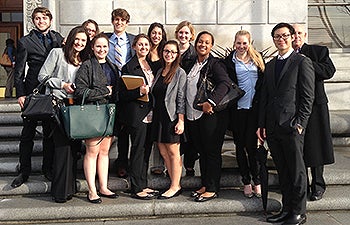Supreme Opportunities
As the USC Dornsife students filed into the California Supreme Court in San Francisco, they eyed the long line of attorneys in front of the building. Due to the importance and popularity of the cases, many waiting were turned away.
The students savored an unusual sense of privilege.
The brainchild of former criminal attorney James Brecher, associate teaching professor at USC Dornsife’s Writing Program, the senior-level seminar “Writing 440: Advanced Legal Writing” takes the study of legal writing and analysis out of the hypothetical and directly into the practical world. The seminar is designed to facilitate engagement between undergraduates and the American legal process. Instruction takes place in the classroom and at several court rooms across the state, including class visits to proceedings at the California Supreme Court in San Francisco and the Ninth Circuit Court of Appeals in Pasadena, Calif.
At the semester’s start, the class selects current cases on the court’s docket and the trial court records are analyzed. Working collaboratively, students write argumentative briefs based on these court records and present team-based oral arguments in a mock-court setting.
On March 3, the class traveled to the California Supreme Court in San Francisco to hear the arguments for two cases, one a class action lawsuit by U.S. Bank employees who claimed they weren’t being paid for overtime. The other involved the Los Angeles Times petitioning to have the names of Long Beach police officers involved in a shooting of an unarmed man publicly disclosed.
After returning from court, students prepared analyses of what they believed the court’s final decision should be based on that day’s proceedings. In 90 days when the judge’s decisions are released, the students will compare their analyses to that of the courts.
Senior Taylor Fisher analyzed the case involving the police shooting.
“At first, I thought, ‘of course we should disclose their names.’ But then professor Brecher assigned me to the opposing side to get my brain thinking.”
In the end, along with freedom of information, she considered the potential backlash releasing the names could cause. She thought about gang retaliation and the safety of the officers’ families.
“Visiting the court in San Francisco was an amazing experience,” Fisher said. “We got to see and think about some really interesting cases dealing with social issues that affect us as everyday people.”

James Brecher’s class in front of the California Supreme Court in San Francisco, which they visited in March to witness court proceedings for cases they had analyzed in class. Photo courtesy of James Brecher.
Brecher’s seminar is an extension of his “Writing 340: Pre-law Writing” course.
“I get some of the most accomplished students across a wide range of majors who want to be really well-prepared for elite law schools,” Brecher said. “I choose eight to 12 students each semester and treat it as a graduate seminar in that I’m trying to teach them the next level of intellectual and legal thinking.”
Junior Natalie Tecimer, an international relations major at USC Dornsife, took “Writing 340” with Brecher and liked it so much she signed up for “Writing 440.” She is planning to attend law school after graduation and hopes to become a litigator in either child and family or international law.
“Professor Brecher teaches in a very Socratic way, which I like,” she said. “Our group is really diverse in disciplines and backgrounds, and we benefit from great discussions.”
Tecimer studied the U.S. Bank class action lawsuit.
“My team represented the petitioners, so we wrote our briefs from that perspective. In court, the lawyers from our side were pretty good, but the lawyers for the bank weren’t as impressive. So, we felt that even though our argument in the case might have been a little weaker, in court our side actually performed better.”
During the in-class oral arguments before the visit, professor Brecher acted as the judge, asking the students difficult, thought-provoking questions.
“In San Francisco, one of the justices that day was Justice [Goodwin] Liu,” Tecimer recalled. “He was very to-the-point and direct with his questions for the lawyers. It was interesting to see Justice Liu ask almost the exact same questions that Brecher had asked us.”
Fisher also appreciates Brecher’s approach to teaching. A politics, philosophy and law major at USC Dornsife, she has taken many theory-based courses, but values the way he challenges her to think outside the box and apply both a practical and analytical perspective in her writing, she said. His background as a criminal lawyer also complements her interests, including her minor in forensics and criminality. After law school she hopes to work in a district attorney’s office.
After the court visits, Brecher invites officials from court clerks to judges to speak with the students about a case.
“Once you’ve worked with them, the clerks and judges are really friendly,” Brecher said. “They have been impressed with my students and want to know what they can do to help them learn even more.”
While in San Francisco, students had a chance to network with USC alumni during a reception. They also attended a lunch hosted by the University of San Francisco School of Law, which featured a roundtable discussion about law school.
“I met two externs working for California Chief Justice Tani Cantil-Sakauye who were law students from University of California, Davis,” Fisher recalled. “It was great to pick their brains, network and learn about their impressive jobs.”
The class also includes a tour of USC Gould School of Law and a visit to a law class.
“They’re learning so much about what law school is and putting it all together,” Brecher said. “These are fabulous students who will accomplish fabulous things.”